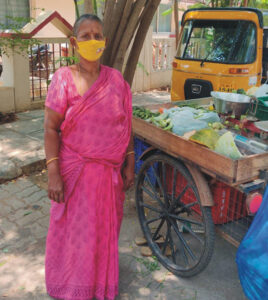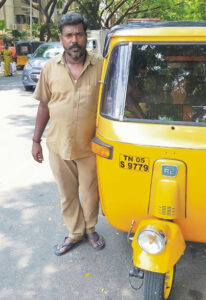Registered with the Registrar of Newspapers for India under R.N.I 53640/91
Vol. XXXI No. 2, May 1-15, 2021
Voices of Chennai: Living through a pandemic
by Varsha Venugopal
A vegetable a day keeps the doctor away: Vijaya

Vijaya, with her vegetable cart.
For most residents of Alwarpet, Vijaya is a familiar face. She’s been selling vegetables in the locality for 25 years, covering Venus Colony, Ambujammal Street and Maharajah Surya Rao road in her daily rounds. “I took over the business from my mother when she began losing her eyesight,” she says, proudly adding that she’s worked hard to bring up her children, a son and a daughter. “My son has studied a computer science course and has a job, but he helps me out sometimes,” she smiles.
The routine that she’s followed for all these years hasn’t changed much with the pandemic. She leaves home at 2.45am in the morning to board a mini truck that takes people to the Koyambedu market. She finishes purchasing the wholesale vegetables she needs by 5 a.m. and begins selling them in her locality on her cart, or tray cycle as she calls it, by 5.45 a.m.
Her routine earns her a daily income of roughly Rs. 500; sometimes, she barely breaks even. “Business was booming last year during the lockdown though,” recalls Vijaya. “Some customers had switched to placing orders online, but most continued to buy from me since they trusted me and knew I brought quality stock. They would even call me on my phone to list the vegetables they needed and transfer the money directly to my bank account.”
Concerned about rising cases, her son had sent her to her daughter’s home in Tambaram last year in a bid to give her some rest from work. “I couldn’t stay put for more than two months,” laughs Vijaya. “I resumed work and even today, I take leave only on Sundays.”
The shifting of the wholesale vegetable market from Koyambedu to Maduravoyal was harder for her. “It was so far off and the place was full of muddy, flooded ditches and crowded to boot,” she shudders. “I’m glad we’re back to Koyambedu. It’s clean and well maintained now. The number of wholesale shops have reduced so it’s less crowded than before. Our temperatures are checked everyday, we’re reminded to wear masks and keep our hands clean. Even the transport vehicles are sanitized on a regular basis,” she says.
When asked if she received sufficient government assistance to tide her through the pandemic, she shakes her head. “I received a one-time payment of Rs. 2,000 allocated to my ration card, nothing beyond that,” she shrugs. “I did get a lot of help from customers. They chipped in with cash or provisions like rice, lentils and oil to support me in times of need.”
Vijaya has received both doses of the covid vaccinations at Agarwal Eye Hospital in Alwarpet. “My son took me. In fact, it was a customer who gave me the money to buy the doses,” she says. “I am perfectly happy right now, I’m not particularly worried about the situation. As long as we’re mindful of the preventive hygiene measures and have each other, we should be able to handle this,” she finishes.
Still searching for a silver lining: Damodaran

Damu.
One can usually find Damodaran a.k.a Damu at the auto stand opposite the Thiruvanmiyur bus stop. He’s hardly on the road these days though. “People are scared to come out and even if they do, they’re reluctant to get into an auto,” he says.
The latest government order has only made things harder. “We’re not allowed to take more than two passengers in an auto. So when families with more than two people come by, they decide to take the bus instead. Why would any family take two autos when they can travel together?” he asks. He estimates that he is able to earn only 40 per cent of his regular income these days.
The increase in gas prices have crunched his profit margins further, too. “Last year, when the pandemic hit, gas prices were at Rs. 33.80. Today, it’s shot up to Rs. 53.70,” he points out. Damu also says that he hasn’t really benefited from government help in these tough times. “Auto drivers haven’t received any sort of cash assistance from any party as a matter of fact,” he says. “All I got was the usual provisions that we receive through our ration cards.”
When asked if he’s considered tying up with apps like Ola or Uber, he shakes his head. “They’re not doing great either,” he shares. “Things are getting harder to manage, but I don’t know any other business. I simply have to continue to do my best,” he finishes.
Keep calm and carry on: Sindhu
Sindhu came to Chennai after completing her nursing course in Kerala. It’s been 14 years since she started working here. But things have never been as hectic as they are today.
“Work has been demanding. The hours are longer and I have to take care of worried patients, too. They tend to read all sorts of things from various sources and work themselves into a panic,” she explains.
The current strain on medical resources has only made things worse. “People begin to panic the minute they see a small dip in their oxygen levels. I have to calm them and educate them on self-monitoring protocols,” she explains.
Sindhu typically reports to work at 8 a.m. and continues working until 6 p.m. on most days. “We have to suit up in PPE kits while treating patients. It’s so hard to wear them – it gets incredibly hot and sweaty but we don’t really have a choice,” she says stoically. As I hear her words, it’s hard not to think about people who complain about wearing masks – that hardly seems like a discomfort compared to Sindhu’s daily ordeal.
In fact, Sindhu can’t enter her home after finishing duty, given that she works in close quarters with patients all day. She calls her son in advance on her way home so that he is prepared for her arrival. Luckily, her room is right next to the entrance so she takes a bath the minute she reaches and washes her clothes too, before joining her family.
“I have to be extra careful, it’s true,” she says. “But my work isn’t an ordinary one. I see it as social service. The situation is hard and we must rise to the occasion.” When asked if she had anything to add to the interview, Sindhu jumps in with a few pieces of advice. “Double masking is the need of the hour,” she says. “Wear double masks, sanitize your hands regularly. If you find yourself tested positive, do not panic. Follow doctor’s orders, eat well and remain calm,” she finishes.

